A new study published by the "New York Post" reveals that "cooking on a gas stove can generate particles that are up to 100 times more dangerous than car exhaust." Researchers from Purdue University found that gas stoves release fine particles that make individuals more susceptible to asthma and other respiratory diseases. Associate Professor Brandon Bor from Purdue’s Lyles School of Civil Engineering stated, "These nanoparticles are so small that you can't see them. They are not like dust particles that you might see floating in the air." He added, "After observing such high concentrations of nanoparticle aerosol while cooking with gas, we can't ignore these particles any longer."
Bor and his team used the latest air quality measuring devices provided by the German company GRIMM AEROSOL TECHNIK for this study. Through this technology, they were able to measure these tiny particles, each one a nanometer in size, while cooking on a gas stove in a "tiny house" laboratory. The tiny house was equipped with all the features of a typical living space and was also fitted with sensors to closely monitor the impact of daily activities on indoor air quality.
The results revealed that nanoparticle aerosols are highly persistent in their journey from the gas stove to the rest of the home. While many of the particles spread quickly to other surfaces, experiments indicated that between 10 billion to 1 trillion particles can deposit in the airways and trachea of the lungs while the stove is in operation. Researchers encourage families to run exhaust fans while cooking, believing it is likely to redirect the particles away from the lungs. Bor concluded, "Since most people do not turn on their exhaust fan while cooking, having kitchen hoods that activate automatically would be a logical solution."




